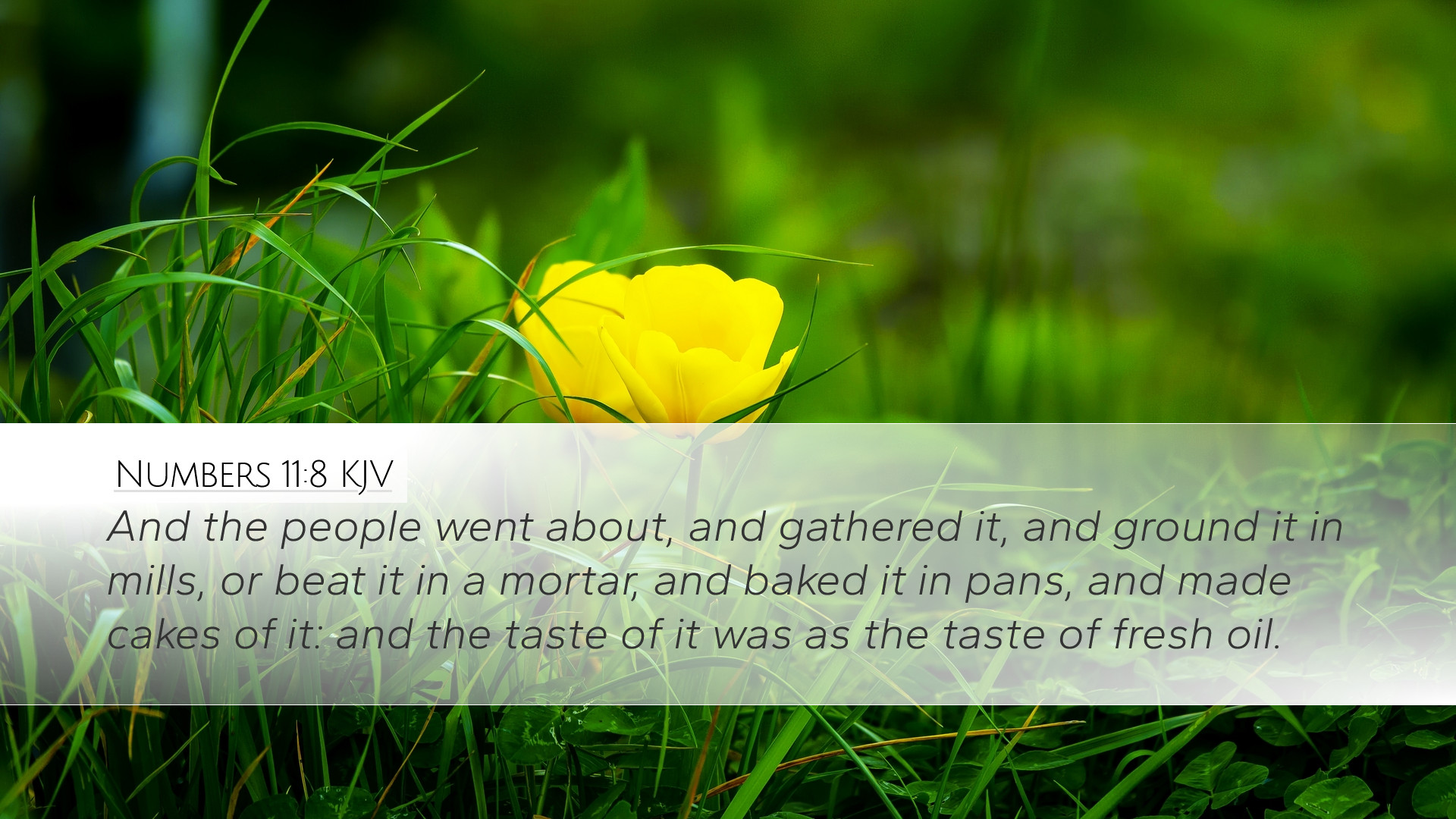Commentary on Numbers 11:8
Text of Numbers 11:8: "And the people went about, and gathered it, and ground it in mills, or beat it in a mortar, and baked it in pans, and made cakes of it: and the taste of it was as the taste of fresh oil."
Introduction
This verse is part of a crucial narrative in the journey of the Israelites through the wilderness. It illustrates God's provision in a time of need, the people's response, and the significance of divine sustenance. Various public domain commentators have offered valuable insights into this verse, which provide a deeper understanding for pastors, students, theologians, and scholars.
Contextual Background
The events of Numbers 11 occur in the context of Israel's wilderness wanderings, marked by human frailty and divine faithfulness. Complaints arise from the people regarding their diet, which leads to God's miraculous provision of quail and manna. This particular verse focuses on the process of gathering and preparing the manna, showcasing both the effort involved and the goodness of the food provided by God.
Insights from Matthew Henry
Matthew Henry offers a nuanced perspective on this passage:
- Effort in the gathering: Henry emphasizes that the Israelites had to actively gather the manna. This involvement signifies their cooperation with Divine providence. Spiritual nourishment requires effort on the part of believers, paralleling how the Israelites had to collect the manna daily.
- Divine provision: Henry points out that God’s provision is often given in a way that requires human participation. Manna symbolizes the sustenance God provides, echoing the idea that believers must seek out their spiritual nourishment.
- Taste and quality: The manna’s description of having a taste like fresh oil underscores its quality. Henry interprets this as a metaphor for the richness of God's grace, noting that the blessings from God are not just sufficient, but also delightful.
Insights from Albert Barnes
Albert Barnes adds depth to the understanding of this verse through his commentary:
- Preparation of manna: Barnes explains the various methods of preparing manna, highlighting the communal effort and cooperation among the Israelites. This act of working together is significant in building community and reliance on God’s provision.
- Symbolism of the cakes: The cakes made from the manna symbolize spiritual sustenance. Just as physical food is necessary for survival, Barnes stresses the importance of spiritual food, which comes from God’s Word, emphasizing the need for daily spiritual nourishment.
- Nature of complaints: Barnes also contrasts the Israelites’ complaints about their previous diet in Egypt amidst God’s generous provision. This serves as a warning against ingratitude and highlights the tendency of humans to overlook divine blessings.
Insights from Adam Clarke
Adam Clarke provides a scholarly examination of the text:
- Culinary methods: Clarke highlights the various methods by which the manna was prepared, noting that it required ingenuity and effort. This serves to illustrate that while God provides, humans must engage with His provision, thereby deepening their relationship with Him.
- Comparison to other food: The comparison to fresh oil is particularly striking for Clarke, drawing upon the cultural significance of oil as a source of nourishment and an illustration of abundance. He delves into the theological implications, suggesting that God’s provision exceeds mere sustenance; it is a rich experience.
- Spiritual lessons: Clarke calls readers to recognize the spiritual lessons inherent in their nativity and the necessity for diligent faith in God’s ongoing provision. Faith is illustrated through the daily act of gathering, which symbolizes the believer's daily dependence on God.
Theological Significance
Numbers 11:8 offers rich theological implications. The gathering of manna can be regarded as a precursor to the Lord’s Supper, where believers actively receive and partake in the body of Christ. This form of spiritual feeding emphasizes the relationship between faith and participation. Moreover, it reflects God’s desire to provide both physical and spiritual sustenance.
Practical Applications
From this verse, several practical applications emerge for modern readers:
- Diligence in faith: Like the Israelites gathering manna, believers are called to actively seek spiritual nourishment through prayer, study, and community.
- Gratitude for provision: The verse serves as a reminder to cultivate gratitude, recognizing God’s continuous care and abundance in our lives.
- Unity in community: The communal effort in gathering reflects the Christian call for cooperation and support within church communities.
Conclusion
In summary, Numbers 11:8 provides a profound reflection on God's provision and the human response that follows. The insights from Matthew Henry, Albert Barnes, and Adam Clarke collectively enrich our understanding of this verse, inviting a deeper exploration of faith, community, and the necessity of spiritual nourishment. Pastors, students, theologians, and scholars can draw from this commentary to unpack both the historical context and contemporary implications for believers today.


